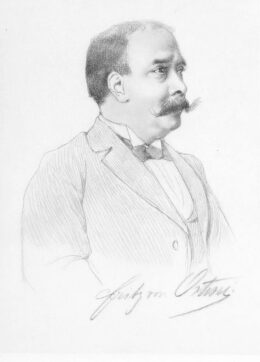
Printed
32 pages
Author(s)
Grey & Co
King Edward's unselige Erben
Grey & Co is a satirical production from the famous Munich theatre of puppeteer and stage director Paul Brann (1873-1955), which relayed the German propaganda discourse of the First World War. The various artists who participated in this show were well acquainted with the milieu of the Munich Secession, a movement based on artistic renewal gathered around famous literary cabarets, theatres and illustrated reviews. The illustrator of the front page of the play and designer of the puppets, the Norwegian Olaf Gulbransson (1873-1958), was a regular contributor to the satirical review Simplicissimus. In many ways, Grey & Co reproduces the cultural dynamics to which the war was supposed to put an end. Thus, the play uses satire as a tool at the service of the national and maybe even nationalist causes: this is demonstrated by the characters, Germania and Michel, who embody the traditional idea of the brave German. The acerbic and ridiculous satire of the countries of the Triple Entente, led by England, ends nonetheless with Pluto’s triumph, as he draws the same disillusioned conclusion as Viennese writer Karl Kraus (1874-1936) in The Last Days of Mankind, a play which, for that matter, is much more critical: in the rapacious game played by nations, everybody will lose.
The rapacity of nations
Lord Grey and John Bull are looking for a pretext to declare war on Germany, which is competing with England in the field of industrial development. The announcement of the murder of François-Ferdinand in Sarajevo, related by Kasperl, Grey’s servant, provides them with one such pretext, but they have to distort the event and make it seem as if Austria attacked Serbia. Grey and John Bull gather their allies from the Triple Entente, Prince Wodkasoff and Delcassé. They also join forces with the devil of lies. Kasperl lets a word of indignation slip, and he is thrown in prison. On the German side, Germania warns her husband Michel about the rapacity of their neighbours, when Kasperl, just escaped from prison, comes to warn them about the conspiracy planned by the countries of the Entente. The devil of lies tries to play Hans off against his parents, Germania and Michel, but he is struck with a stick. Wary of Italy, the Germans ally themselves with Josef (the Czech) and Janos (the Hungarian): the Triple Entente goes to war. In 1914-1915, the countries of the Entente fail to make progress against the enemy. Desperate, Grey seeks advice in hell, where King Edward VII plays cards with Pluto and Kitchener. Mammon, the devil of money, is thus sent to corrupt the countries who remained neutral. In Italy, he will even corrupt the poet D’Annunzio in order to make the people rise against Germany. In order to hasten Mammon’s return, Pluto puts the clock forward by one year: it is now 1916-1917, and Grey has been replaced by Lloyd George, a more energetic man. But Lloyd George also goes seek advice in hell. Mammon’s intervention was not sufficient to weaken Germany’s resistance. The devil of lies comes again on the stage, disguised as an angel of peace, to announce that the United States have entered the war. There is an uproar in hell. Pluto concludes the play with a reminder that he will always be the one to win, no matter what: either Germany is victorious, and he retrieves the souls of Grey, Lloyd George, Iswolski, Northcliff, Delcassé “and so on”, or England wins, and planet Earth becomes hell, meaning that Pluto could enjoy his retirement.
First performance
Publications and translations
Fritz von Ostini, Grey & Co., oder King Edward's unselige Erben, München, Marionetten-Theater Münchener Künstler, 1917
